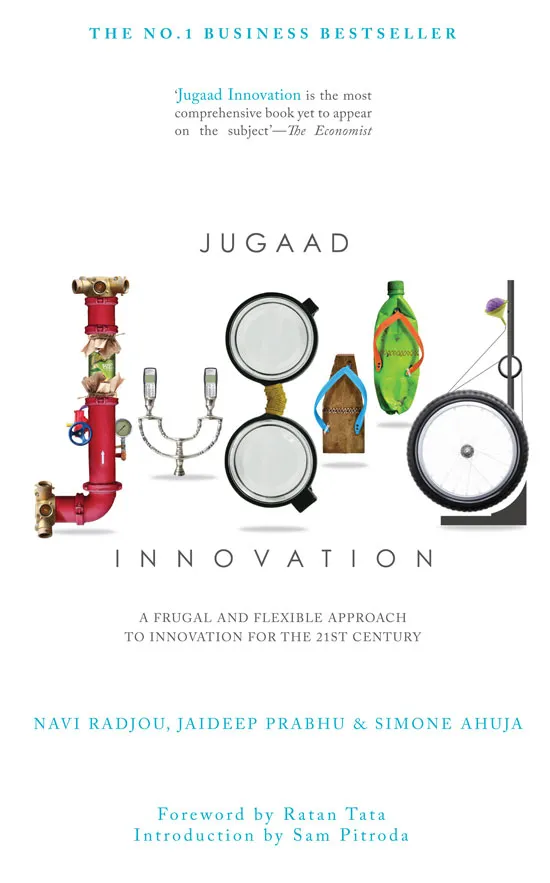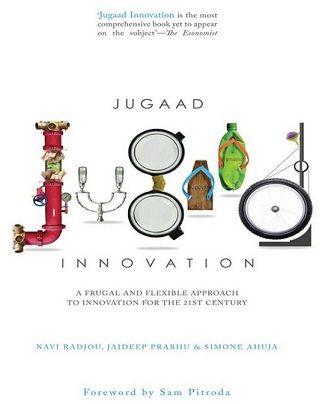“Companies need both a flexible and a structured approach to innovation”- In Conversation with Navi Radjou

Interview with Navi Radjou, co-author of “Jugaad Innovation”
Navi Radjou is a Silicon Valley-based strategy consultant and an internationally-recognised voice of business innovation and leadership. He is a Fellow at Judge Business School, University of Cambridge, and a World Economic Forum faculty member. He is the co-author of the best-selling book, “Jugaad Innovation: A Frugal and Flexible Approach to Innovation for the 21st Century" (see my book review here). Navi joins us in this exclusive interview with YourStory, on topics ranging from startups and innovation to investments and leadership.
Q: What were some of the responses and reactions you got when your book Jugaad Innovation was released?
In 2008, when we began to popularise the jugaad concept in op-eds and blogs, we got some serious pushback from Western readers who felt that jugaad is irrelevant in a Western context since Western economies don't suffer from the same level of scarcity as developing nations like India do. But as the economic recession deepened in the US and Europe, people there started to recognise that Western economies would be facing massive resource scarcity for years to come. That awareness led them to become more receptive to the concept of jugaad, which is essentially a new approach to innovating faster, better, and cheaper. It's a timely approach for resource-constrained Western economies.
In India, the initial reactions to our book were mixed. People felt that by praising jugaad we were trying to glorify an approach to innovation that produces shoddy products -- or worse, can result in illegal activities. But as more people in India read our book, they came to realise that what we were NOT praising the "chalta hai" aspect of jugaad, but rather showcasing the resourcefulness, resilience, and the creative adaptation of Indian entrepreneurs in the face of adversity. These entrepreneurs -- like Harish Hande at SELCO, Jane Chen at Embrace, and Rana Kapoor at YES Bank -- are using the flexible jugaad thinking to come up with socially-inclusive innovations that make clean energy, healthcare, and banking services affordable and accessible to more Indians.

Q. Your recommendations on how to create ‘jugaad nations’ were very insightful. How many other countries now have formed such ‘jugaad innovation’ policies?
The UK government is very keen to promote jugaad innovation policies to make public services like healthcare affordable to more British citizens as the UK enters the "Age of Austerity" as Prime Minister David Cameron has put it. NESTA, a British policy think tank, has just published a report entitled "Our Frugal Future? Lessons from India's innovation system" -- which suggests ways the British government could apply the jugaad innovation techniques to drive inclusive growth in the UK context. Our book has received favourable reviews in UK-based media such as The Economist, Financial Times, and BBC which helped build awareness and appreciation among British policy-makers for the jugaad concept.
I am currently working with two Dutch Entrepreneurs -- Michiel Rogaar and Ruben Nieuwenhuis -- who have begun a movement called DutchJugaad. You can follow them on Twitter @DutchJugaad. They are eager to promote the jugaad concept in the Netherlands as a way of encouraging grassroots innovation that can catalyse inclusive and sustainable growth in that country. They are planning a conference in 2013 that will bring together public sector officials and private sector executives to discuss how to transform the Netherlands into a "jugaad nation".
In our book, we describe at length how the US government is also eager to support jugaad. The White House Office of Social Innovation and Civic Participation -- whose founding director was Sonal Shah -- has been supporting grassroots innovators since its inception in early 2009 (when it was set up by President Obama).
Recently, Michael Bloomberg, the mayor of New York City, has designated September 24-30 "Maker Week" in New York. Every year, New York hosts the World Maker Faire, an annual event that brings together creative engineers, scientists, tinkerers, and innovators to showcase their ingenuity and share their passion for do-it-yourself (DIY) innovation. The MAKER movement which is growing by leaps and bounds in the US in recent years -- and the support this movement is getting from famous US political figures -- is clear evidence that America has always been -- and will always be -- a nation of MacGyvers. MacGyver is the quintessential American jugaadu: he was a famous TV action hero in the 80s/90s who was able to solve any problem he faced by relying merely on his Swiss Army Knife and any resources at hand. He was a master at jugaad!
Q. What do you see as the connection between jugaad innovation and reverse innovation?
Jugaad innovation is less about making a product or service more affordable and more about the flexible and inclusive MINDSET that helps create that affordable product in the first place. Metaphorically speaking, we believe a multinational that comes to India merely to "source" a low-cost product and bring it to the West is simply "catching a fish". But a multinational operating in India that adopts the jugaad mindset and tries to infuse that frugal and flexible mindset into the rest of its global organisation is "learning HOW TO FISH". Getting a fish can keep you well-fed for one day, but learning how to fish will keep you fed for the rest of your life!
That's why we insist in our book that jugaad is not a cookie-cutter approach or standardised technique that you can simply transfer from one region to another, but it's rather a unique and valuable mindset which -- if adopted effectively -- would provide organisations a sustainable competitive advantage in today's complex and resource-scarce global economy.
Q. What are some good examples you have come across of jugaad innovators in one emerging economy (eg. India) cooperating with other jugaad innovators in other emerging economies (eg. Brasil, Kenya)?
Greenlight Planet which has installed affordable solar lighting systems in rural India is now selling its product in over 20 countries and they have now offices Kenya and China. Similarly, DREAM:IN - an organisation focused on empowering Indian youth by training them to become transformational entrepreneurs - has taken its powerful social business model to Brazil where it has been very well received.
Q. In addition to big companies adopting jugaad, what are your findings with regard to startups in emerging economies, eg. 10 people creating a mobile or social media startup?
Our book is filled with dozens of stories of small entrepreneurs and startups who are practicing jugaad innovation. For instance, we showcase Abhi Naha, founder of Zone V, a startup that is collaborating with Sightsavers in India to distribute its affordable and yet cutting-edge cellphones to blind women in the BOP as a way to economically empower them and boost their social status.
Our book also profiles Venkat Rangan, cofounder of INXS Technologies, a software company based in Chennai. After hearing his father constantly complain that his brokerage company wasn't able to execute stock transactions as fast as he wanted, Rangan decided to do something about it. He launched INXS Technologies, which has developed one of the world’s largest mobile trading platforms. The platform called MarketSimplified helps speed transactions through mobile phones for millions of customers of the world’s leading brokerage houses.
Q. What are the typical challenges entrepreneurs face as they scale up their company from an emerging economy market to a mature economy market? How can these challenges be addressed?
There is more willingness to experiment and hence more tolerance for failure among consumers in emerging economies which by nature are unpredictable and in a constant flux. But in mature economies, which are more stable, consumers expect predictability and quality from suppliers. That's why in our book we argue that the most successful entrepreneurs (and corporations) will be those that know how to integrate the flexible jugaad approach to innovation -- which enables you to sense and respond swiftly to rapidly changing customer needs in emerging markets -- with the "structured" approach to innovation -- which gives you the economies of scale and quality-focus that are key to win and retain customers in large mature economies.
Q. What trends do you see in venture capital movement from mature to emerging economies? Are they also investing in ‘jugaad’ startups, or do they prefer replicas of mature models from Silicon Valley?
This is an interesting question. I actually see a growing dichotomy in the VC model. Most Silicon Valley VCs who foray into emerging markets tend to play it safe and primarily invest in startups in emerging markets that "tropicalise" a proven Western business model -- i.e., create the Brasilian or Indian version of eBay or Amazon. Or they may invest in startups in emerging markets that play in a "hot" tech field like mobility or social media. But I do see a small but growing number of investors like Acumen Fund that are investing in socially-conscious jugaad startups that employ an inclusive business model. These social venture capitalists are primarily interested in investing in startups in emerging markets that have honed a "locally relevant" business model rather than blindly copying/adapting a proven Western model.
Q. How should innovators strike that delicate balance between ‘Stick to your vision’ and ‘Adapt to a changed world’?
LinkedIn's cofounder Reid Hoffman often talks about "flexible persistence" as a top virtue an entrepreneur needs to cultivate. As an entrepreneur you need to have the discernment to know when to stick to your vision and when to adapt to a changing world. A smart entrepreneur is one who obstinately sticks to his/her business plan without heeding changes in the external context; a wise entrepreneur has the fortitude to stick on course when needed and yet is humble enough to shift course whenever external circumstances require it.
Smart entrepreneurs were highly successful in the stable 20th century. But the volatile and complex 21st century belongs to wise entrepreneurs.
Q. Is there such a thing as the ‘ideal age’ for an entrepreneur, or can the startup bug strike you at any time? How should people keep themselves open for adopting an entrepreneurial career later in life?
I do not believe that creativity or ingenuity is age-dependent. Some of the world's best known serial inventors such as Ben Franklin and Thomas Edison were prolific innovators who kept churning out new ideas and businesses well into their mature age. Being an entrepreneur is really a state of mind and has nothing to do with one's physical or physiological ability. Being open and curious all the time -- just like children do -- is the best formula for priming your mind to think creatively like an entrepreneur.
Q. Who are some of the entrepreneurs you admire the most in the US today? In Europe? In Asia and elsewhere? What is that makes them role models?
In the US, I really like Sal Khan, founder of Khan Academy. He is really using a jugaad approach to make math and science teaching more fun and accessible to thousands of young students worldwide. And all the courses are FREE: that's simply ingenious!
In Europe, I have high respect for Abhi Naha, founder of Zone V (mentioned above): he is on a mission to empower blind people worldwide, especially blind women in BOP markets. He has enlisted top talent such as Frank Nuovo, former head of design at Nokia, to create cellphones that are good-looking and yet deliver superior functionality at affordable price for blind people worldwide. I really like Naha's tagline: "lack of sight doesn't mean lack of vision."
In India, I admire many entrepreneurs including Harish Hande, founder of SELCO. I like Harish's authenticity and his genuine compassion for the plight of those who live in BOP markets: and he has done a remarkable job debunking the myth that poor people can't afford clean energy. He is truly driven by a noble purpose.
Q. What is your next book going to be about?
My next book is entitled From Smart To Wise and will be published in the US by Jossey-Bass in March 2013 (it will also be published in India afterwards). I co-authored it with Dr. Prasad Kaipa, a CEO coach and ISB faculty member. It is a book on personal leadership. It offers a fresh and timely approach to nurturing wise, resilient, and flexible leadership in a world of growing complexity.
The premise of this book is that leaders tend to obstinately stick to the leadership style that brought them most success in the past, usually one of two extreme styles: functional leadership that focuses on operational excellence or smart leadership that focuses on growth. When a leader's focus is too functional, the organisation becomes introverted and can focus too much on bottom-line profitability while missing out on top-line growth opportunities. But when leaders focus too much on smart leadership, the organisation may experience quick growth but lose its effectiveness quickly.
From Smart to Wise offers a new approach that balances the two styles to achieve a form of wise leadership that is both functional and smart. Drawing on inspiring real-life stories of historical and contemporary wise leaders such as Bill Gates, Warren Buffet, and even Mahatma Gandhi, our book identifies the key characteristics of wise leaders and offer a practical framework to help readers develop their own style of wise leadership. The book is now available for pre-ordering on Amazon.
Q. What is your parting message to the startups and aspiring entrepreneurs in our audience?
I would suggest that they abide by the Principle No. 6 outlined in my book, which is "FOLLOW YOUR HEART". My message to entrepreneurs: Don't seek external validation or approval, but learn to rely on your own intuition, which is your best guide and teacher. You don't need an external guru to advise you on the next steps you should take: simply turn inwards, and your "inner-guru" will shed light on the path you should embark upon!
[Follow YourStory's research director Madanmohan Rao on Twitter]






